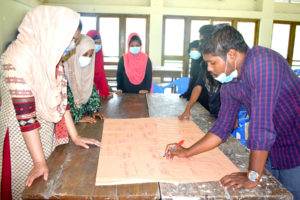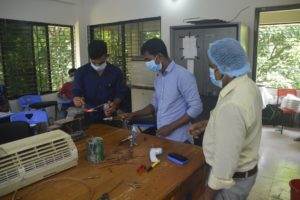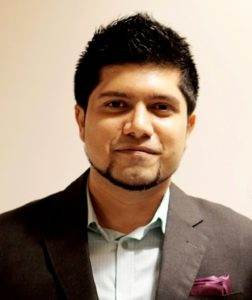Powering Entrepreneurship in Rural Bangladesh
In isolated areas of Bangladesh, electricity is often seen as an expensive luxury. Through our consulting work, we’re helping entrepreneurs in remote communities see the business benefits of electricity. The result is booming small businesses that are powering vibrant rural economies.
Access to electricity in Bangladesh has grown dramatically in the last decade. However, in rural regions, consumption has not kept pace with availability. One of the key reasons for this is that rural communities don’t recognise the full potential of electricity. Many people see it as something that’s useful only within the home. As such, it’s often considered an expensive luxury that many people living in remote areas with tight budgets can’t afford.
It’s estimated that the Bangladesh’s electricity sector needs to increase its capacity by 70% in the next ten years to sustain its economic growth. This increase in capacity needs to be driven by a parallel increase in demand. By encouraging productive electricity use in rural areas, we can create that demand, while also making sure that people living in the poorest and most remote parts of the country benefit.

A group of entrepreneurs learn new skills to help them use electricity to scale their businesses.
A new generation of entrepreneurs
In 2019, Practical Action Consulting Bangladesh initiated a project in collaboration with Bangladesh Rural Electrification Board (BREB). Our focus is on improving rural livelihoods, especially businesses headed by women, by supporting them to use electricity to boost their profits.
Other elements of the work include:
- Increasing the awareness of rural communities on the safe and efficient use of electricity
- Improving working conditions by supporting rural electricity cooperatives for under-represented groups
- Improving the technical and entrepreneurial skills of selected enterprises.
A powerful new partnership
BREB operating under the Government of Bangladesh, received a grant from Japan Fund for Poverty Reduction (JFPR) to implement this project, which is administered by the Asian Development Bank.
A challenging but extremely rewarding aspect of this work is that BREB is mainly involved in electricity distribution. Working with consultants to implement a social development project was entirely new to them. They needed to be oriented on market development approaches, gender theories and various technical models in order to review and finalise the activity plans effectively. Our success is the result of extensive effort to effectively create a synergy in the work approach and culture between both the parties.
Diversification and knowledge sharing
Working with business owners to identify opportunities to invest in electric devices to expand and diversify is an important part of our work. For example, a dairy farmer could invest in a small fridge to store their diary produce for longer period, in addition to cattle rearing. Similarly, a farmer could invest in a sewing machine, which they could use to make clothes to sell.
To identify the best opportunities for diversification, we teamed up with our partners on the ground to carry out a comprehensive assessment in the project area. We identified several promising gaps in the market:
- Tailoring
- Air conditioner and washing machine repair
- Mobile phone servicing
- Beauty salon services
- Electricity wiring for homes
- Basic computer services (such as helping people write emails and documents)
- Technology use in agriculture
Overcoming barriers faced by women entrepreneurs
As well as identifying areas for diversification, the assessment also revealed some of the constraints faced, especially by female entrepreneurs, in delivering a service effectively and expanding their customer base. We went on to explore these constraints more fully in interviews and focus groups with women.

Sajeda Sultana training two aspiring tailors.
Some of the key constraints behind female entrepreneurs’ participation in the electricity or energy based small businesses were:
- Societal barriers
- Limited support from family members
- Lack of knowledge on productive use of electricity and relevant business ideas
- Limited financial capacity
The gender experts we worked with during this assessment phase highlighted that minimal support in the form of training would enable the aspiring female entrepreneurs to benefit from increased income opportunities.
Training for success
We worked with a research firm to interview a mammoth 30,000 people from a list of consumers provided by BREB. 2,100 of the most talented entrepreneurs in remote rural communities were chosen to take part in our training.
“I received the technical training on tailoring organised by BREB and Practical Action Consulting which has really helped me to improve my existing skills and now I earn average incremental profit of BDT 7000 per month. After the training, I have also started providing training to two female aspiring tailors, from where I earn BDT 3000 per month. I hope I can provide such training to more aspiring tailors in the future.”
Sajeda Sultana, business owner in Gopalganj, Bangladesh

Hazifur Islam receiving technical training on servicing air conditioning units, organised by BREB and Practical Action Consulting.
Training partners
To develop and deliver the training, we collaborated with government appointed regional training institutes such as Technical Training Centres (TTC), Youth Training Centres, BSCIC, Youth Development Centre and others.
The training on safe and efficient use of electricity was delivered by the Palli Bidyut Samity (PBS) management team and trainers, based on the established guidelines set by BREB. The entrepreneurial training was conducted by business development specialists.
The training module capitalised on our year long experience in the field of various enterprise development models and approaches.
Representatives of successful local businesses and financial institutions were also invited in the training to share their practical experiences with the training participants.
“My father was a farmer and he did not manage to give me a proper education as a child. I used to earn a living by providing motorcycle taxi service in our area but the vehicle belonged to my father in law. I really wanted to do something completely on my own and support my family. After receiving technical training on mobile phone repair and servicing organised by BREB and Practical Action Consulting, I have now opened up a new store called Arafat Mobile Servicing Centre, where I am able to apply the skills I learned from the training and earn a good income.”
Hafizur Islam, entrepreneur in Kishoreganj, Bangladesh
Scaling up our work
Along with our training programme, we’ve worked with BREB and PBS on a number of guides to help further scale our work to reach more small business owners in future. These guidelines cover:
- The design and implementation of improved communication programs through which rural consumers can be effectively oriented on safe and efficient usage of electricity
- How to motivate more consumers to make productive usage of electricity in various business initiatives (this guide has been institutionalised in all regional PBS)
- Using Geographic Information System (GIS)
- Gender mainstreaming
“BREB’s emphasis on gender aspects in the project strongly aligns with the gender mainstreaming priorities of Practical Action, which has been a great output from this project.”
Susanta Sarkar Subho, Senior Officer- MEL, Practical Action Consulting Bangladesh Ltd.
Working together for greater impact
A notable aspect of the project was the extensive involvement of multiple international and national experts. This collaboration helped us achieve the expected deliverables and establish a platform for significant knowledge exchange. Practical Action Consulting also capitalised on its cross regional office resources, with expert staff in Nepal providing technical assistance in the project. It required extensive coordination and follow up to ensure deliverables were completed as per the deadline and expectation of the donor.
The Covid-19 pandemic affected a lot of the project activities. However, it was remarkable to see BREB capitalize on the usage of digital platforms to conduct remaining trainings and workshops with the support of PBS, to expedite the process.
This project sets the right example for many similar public entities on how a multi-dimensional approach is essential to have a more holistic impact. Focusing on enhancing the capacity of power sources and distribution is not sufficient– it requires additional intervention which follows a more bottom up approach, which is more inclusive in nature.
What is positive to know is BREB plans to scale these activities with its other PBS in all remaining districts of Bangladesh, following the similar approach and putting strong emphasis on the gender mainstreaming.
“This project has supported in developing a comprehensive institutional guideline and an action plan towards supporting the lifeline consumers (who are also the people living in BoP in the rural communities) living around the cooperative to becoming productive energy consumers through the operations of the PBS, thereby broadening their efficacy as an institution towards the region’s economic development.”
Sonia Shahid, General Manager, Practical Action Consulting Bangladesh Ltd.
Lessons learned
For implementers, designing holistic projects can get complex since it requires diverse skills and extensive coordination.
A key learning for the implementation team has been that there is less flexibility in terms of the deliverables proposed when it comes to clients such as BREB. In BREB’s defence, they also have limited room for flexibility as the government has a very strict audit processes which does not leave much room for any modifications in activities stated in the contract, irrespective of proper reasoning.
Specialised organisations such as BREB would generally assign a technical individual as a focal, with stronger background in engineering and less in development projects, which could be a challenge. Hence it is essential for project designers and managers to propose complex deliverables with realistic ambitions!
The introductory meeting for such projects should focus on specifying the scope of each deliverable and documented elaborately to ensure effective implementation of the project activities. The fundamental parameter for the successful implementation of this project has been the strong understanding between both the partners and the respect both have shown towards each others work culture and approach.
From expensive luxury to business necessity. Our powerful partnership with BREB is helping entrepreneurs in rural Bangladesh super-power their livelihoods with electricity. It’s a collaboration that’s resulting in booming small businesses that are right at the heart of their electrified rural economies.

Abu Saif Ansari is Manager-Business Development for Practical Action Consulting in Bangladesh.